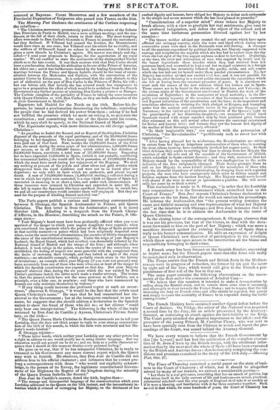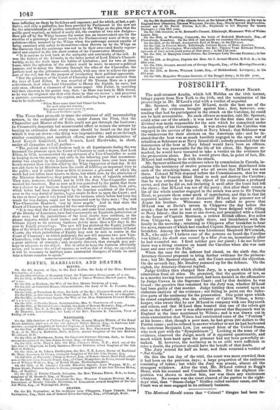The Times of Thursday contained a useful paper on the
state of busi- ness in the Court of Chancery ; of which, lest it should be altogether missed by many of our readers, we extract a considerable portion- " Let there be a real grievance, something that has no smack of politics, but that mixes itself in the daily current of life and business—an actual, practical, substantial mischief—and the wise people of England shall take it as meekly as if it were a blessing, and familiarize with it for three centuries together. Such an evil is that which, for some hundreds of years, the Court of Chancery has
been inflicting on them by its delays and expenses; and for which, at last, a pal- liative, and only a palliative, has been provided by Parliament in the new act
for the administration of justice, introduced by the Whigs on the plea that the
public good required, as indeed it really did, the creation of two new Judges— /hen put off by the Whigs because the season was an inconvenient one for the
exercise of a patronage that would vacate the Parliamentary seats of their ap- pointees—then resumed by the Whigs when the patronage seemed capable of being exercised with safety to themselves—then thrown up by the 'Whigs on the discovery that the patronage was not to be their own—and finally regene- rated and enacted in the late short session of the Conservative Ministry. "It is curious to look back at the antiquity and continuity of the evil. It was the fashion of the Liberals, in the latter period of Lord Eldon's Chancel- lorship, to lay the fault upon his habits of hesitation; and for two or three rears, while the agitation of the subject could be made to answer a political purpose, and to annoy the Ministry through the sides of the Chancellor, the
patriots took up the grievance—not, indeed, with any view to relieve the pres- sure of the evil, but for the purpose of inculpating their political opponents. "Bat the grievance of the Court of Chancery was vastly more ancient than the days of Lord Eldon. It was recorded of Sir Thomas More as a great achievement, that when Lord Chancellor to Henry the Eighth, he once, but only once, effected a clearance of his cause-paper. Old Fuller, in recording this fact, observes in his quaint way, that, as More was born in Milk Street,
so he was the brightest star that ever shone in that via lactea' ; and preserves
a quatrain, commemorating the exploit, and indicating how great a wonder it was to be reckoned-
. When More some time had Chane'lor been, No more suits did remain : The same shall never more be seen.
Till more be there again.'"
The Times then proceeds to trace the existence of still accumulating arrears, in the complaint of Coke, under James the First, that the Chancellor and Master of the Rolls could not get through the business ; in Cromwell's desperate but unsuccessful effort to reduce the arrears by issuing an ordinance that every cause should be heard on the day for which it was set down—the thing was impracticable; and so on through similar complaints, and resultless efforts, under the administration of Lord Keeper Guildford, Lord Somers, Lord Hardwicke, in short, under all dynasties and all parties- " The general start which business took in all departments during the war increased the pressure upon the Court of Chancery in such a degree, that Lord Eldon, in 1812, recommended the appointment of a Vice-Chancellor to assist in keeping down the arrears; and early in the following year that recommen- dation was adopted by the Legislature. Few measures have ever been more keenly resisted than was this relief by the Whig Opposition of that day. It did not snit them to let Ministers have the credit of fulfilling an important duty to the public ; and it suited them as little to remove a grievance of which the worth had not before been known to them, but which now, by the admission of the Ministers themselves, they perceived to be a mine of valuable mischief. They were, however, defeated; and in 1813 the first Vice-Chancellor com- menced his functions. But as soon as it was perceived by the public that there was a chance to get business despatched within reasonable time, fresh suits, which before had been discouraged by the hopeless condition of the Court, even to the very denial of justice, began amain to flow in upon the Court ; and in two or three years it was found that the business, which before had been too much for two judges, could not be transacted now by three men ; 'No,' said Vice-Chancellor Shadwell, 'nor by three angels.' And in that state the Court of Chancery has continued for five-and-twenty years. "It is true that the Court of Exchequer, and some local courts, such as that of the Dutchy of Lancaster, have had concurrently an Equitable jurisdiction of their own; but the jurisdictions of the local courts were confined, as the phrase imports, within local limits; and the Court of Exchequer could not without injury to its ordinary business, devote more than a few days in the year to Equity proceedings. The new bill has abolished the Equity jurisdic- tion of the Court of Exchequer; and except for the small intervention of Local Courts, the whole jurisdiction of Equity may now be said to centre in the Court of Chancery ; to which judicature the new bill annexes two new Vice- Chancellors, with the necessary staff of Court-officers. Here is, undoubtedly, a great addition of strength ; and, properly directed, that strength may per- haps be adequate to the object. But in order to keep the business effectually under, and to meet the evil of expense, as well as that of delay, we apprehend it will be necessary to institute some substantial changes ; of which we shall take a future occasion to speak."



























 Previous page
Previous page